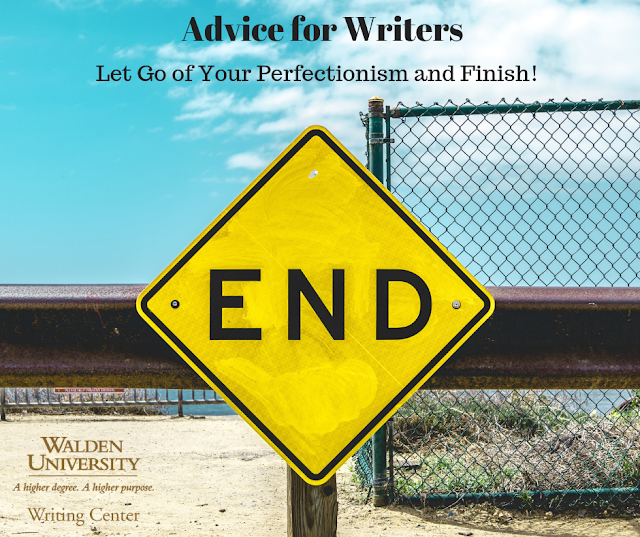Advice for Writers: Let Go of Your Perfectionism and Finish!
Even if you wouldn’t consider yourself a perfectionist, generally speaking (have you seen the state of my laundry piles?), perfectionist thoughts and tendencies have a bad habit of showing up when we sit down to write. For many writers, finishing a writing project has just as much to do with responding to perfectionism as it does with the words on the page. Here are some strategies to combat perfectionism in your writing process. I’ve adapted these strategies from a book that has been helpful to me lately: Finish: Give Yourself the Gift of Done written by Jon Acuff.Cut Your Goal in Half
When we face down a big goal, it can be crippling. We might set the goal with the best of intentions, but if it’s too big, it will be overwhelming rather than motivating. This is why it’s important to break down larger tasks. Instead of “write my literature review,” it’s much easier to work on “find and download ten relevant sources from the library.” The goal of “finish my dissertation” might be paralyzing, but “spend 25 minutes working on an outline for one section” is doable.
If the perfectionist voice in your head is speaking up right now, it’s probably telling you that a smaller goal isn’t good enough, that if you write one chapter by the end of the term rather than two, there is no way you will finish your capstone on time. Actually, one study described in Acuff’s book indicated that when people cut their goal in half, 63% of them increased their performance over previous attempts, and 90% felt more motivated to work on their goal. That’s right: cutting your goal in half can actually make you more productive.
Double Your Timeline
Sometimes it isn’t possible to cut a goal in half. After all, your professor probably expects a full prospectus or capstone rather than one that includes half of what they’ve asked for. In these cases, when you have the control to do so, consider doubling your timeline. You may find yourself feeling anxious at lengthening an already long timeline, but in reality this longer timeline will probably be more reasonable and lead to better, and perhaps even faster, results. For example, Acuff cited a study where one researcher asked students to estimate how long they expected it to take to finish their theses in both the best circumstances and the worst ones. Interestingly, less than 50% of them finished by their longest estimate. This indicates that we often underestimate how long it will take us to complete a task and need to lengthen our timelines to make them manageable.
Do Less to Do More
Of course, there are also times when both the goal and the deadline are fixed, such as when a course assignment is due. When this happens, you need to focus as much attention as possible on achieving your goal within the time allotted. To do this, you’re probably going to have to give something up in another area of your life, at least temporarily. This means disregarding the voice of perfectionism, which will tell you that you can give 100% to your work, school, family, and social lives all at once. Instead, choose what you are willing to let go to achieve your goals. Perhaps that’s a Netflix habit, social media (though not the Walden Writing Center blog, of course!), or doing certain household chores yourself. Is there anything you can eliminate from your busy schedule to allow more time for your goal? If not, how can you simplify what you have to do?
Build in Rewards
In theory, finishing an assignment, class, or degree program should be its own reward, but that’s actually perfectionism talking again. For most people, writing is hard work, so give yourself some rewards for putting in the effort! Maybe you can enjoy your favorite treat or playlist while working on your project to make it feel more enjoyable. When you’ve worked towards a big, long-term goal consistently for a week or a month, do something special for yourself to recognize your hard work. And, of course, make a plan for what you’ll do to celebrate once you’ve finally achieved your goal. These rewards don’t necessarily have to be expensive or time consuming (though they can be, if you like). They should be something that you will find motivating and be able to indulge in guilt-free.
What steps will you take to let go of your perfectionism and finish your writing project?
The tips in today’s blog post have been adapted for Walden writers from Jon Acuff’s Finish: Give Yourself the Gift of Done.
Cheryl Read is a Writing Instructor in the Walden University Writing Center. Her reward for finishing her PhD will be a family trip to Disney World. When she's not helping student writers at Walden, Cheryl stays busy playing with her son and knitting.
.png)
Never miss a new post; Opt-out at any time
Subscribe to:
Post Comments
(
Atom
)





No comments :
Post a Comment